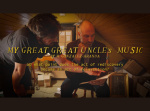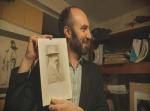

LOGLINE
A filmmaker documents the revival of a forgotten composer’s music, only to question how stories are shaped, remembered, and rewritten through filmmaking itself.
SYNOPSIS
When filmmaker Mauricio Gonzalez-Aranda first met cellist Tobias van der Pals, he was struck by the scale of his mission: resurrecting the lost works of his great-great-uncle, composer Leopold van der Pals, and restoring his place in music history. A prolific composer of 252 works, Leopold had once been performed by major orchestras but had vanished from public memory. Tobias dedicated his life to reversing that erasure, culminating in a triumphant Carnegie Hall performance that seemed to confirm Leopold’s long-overdue revival.
It was the perfect documentary subject—until the story began to unravel. As filming progressed, an unsettling question emerged: had Leopold ever truly been famous? The deeper Mauricio dug, the more discrepancies surfaced. The grand performances Tobias pointed to often came with asterisks—organized by family members, conducted by his brother, or set up through personal connections. If the premise of an unjustly forgotten composer was flawed, then what story was the film really telling?
Rather than a straightforward documentary about artistic resurrection, My Great Great Uncle’s Music becomes a meditation on storytelling itself. Blending archival materials, vérité footage, and diary excerpts, the film explores how history is shaped—not just by talent but by those who choose to preserve it. Who decides which artists are remembered? How much of history is deliberate mythmaking? And at what point does rediscovery become reinvention?
More than just a music documentary, My Great Great Uncle’s Music examines the fragile nature of legacy, the power of narrative, and the human impulse to shape the past to fit the present.
ARTISTIC STATEMENT
I set out to make a film about the resurrection of a forgotten composer’s music. The story seemed clear: Leopold van der Pals was once a renowned composer whose works had disappeared, and his great-great-nephew Tobias was leading a monumental effort to restore his legacy. The film would follow Tobias as he recorded orchestras, unearthed archives, and fought for recognition. It was a story about artistic obsession, perseverance, and cultural memory.
But as I filmed over the years, I began to notice something unsettling: the narrative I had constructed wasn’t aligning with the reality in front of me. The more I examined Leopold’s history, the more I questioned whether he had ever truly been famous. What I thought was a story of loss and redemption became something else—an exploration of how we shape stories, how we choose what to remember, and how history is often more fragile than we assume.
As a filmmaker, I had to confront the uncomfortable realization that I was not simply documenting history—I was shaping it. Every choice I made, from what footage to include to how I framed Tobias’s words, had the power to construct a legacy as much as uncover one. My Great Great Uncle’s Music became a film not just about rediscovery, but about the process of storytelling itself. It became a meditation on how narratives are formed, how history is written, and what happens when reality doesn’t fit the story we want to tell.
At the heart of this reckoning was a conversation with Tobias. I had been pressing him on the question of Leopold’s fame, increasingly aware that the premise I had based the film on might be flawed. Finally, he turned to me and asked, “Why are you so obsessed with this question of fame?”
“Because you told me five years ago that he was famous,” I said.
“So, you feel like I deceived you?”
“Yes,” I admitted. “The premise of the story changes entirely if this is a film about an everyday man.”
He nodded, quiet for a long moment, before saying: “Well, I’m really sorry that the film will revolve around a misunderstanding.”
That moment clarified something for me. This is not a film about my own artistic struggles, but rather about the craft of filmmaking and the weight of storytelling. It asks: what happens when a filmmaker’s original premise crumbles under scrutiny? How do we decide what is worth remembering? And what role do we, as filmmakers, historians, and audiences, play in shaping cultural memory? Leopold van der Pals left behind 252 works of music and 32 volumes of diaries, yet his name all but disappeared from history. His music had no recorded legacy—only sheet music, waiting to be played again. Had even one recording survived, perhaps his name would have endured. Tobias’s work to restore Leopold’s music is not just about reclaiming a lost artist, but about proving his worth to the world. But does a name deserve to be remembered simply because someone fights hard enough for it?
This film is ultimately about faith—faith in history, faith in art, and faith in the power of narrative. It is about the fine line between restoration and reinvention, between truth and mythmaking.
As a director, I’ve had to wrestle with my own role in this process. The choices I make will shape how Leopold van der Pals is remembered—or whether he is remembered at all. That responsibility is something I do not take lightly, and it is the central question that My Great Great Uncle’s Music leaves with the audience.
Because in the end, history is not just what happened—it is the story we choose to tell.
KEY CREW

Yuval Shapira - Editor
Yuval Shapira is a Brooklyn-based filmmaker and visual anthropologist. He has edited films for companies including Sight Unseen Pictures, Moxie Pictures, Pulse Films, and DCTV, among others, with projects screened at festivals such as Cannes, Tribeca, and Venice. He also wrote, edited, and produced the audio documentary series Trickster, which was optioned by Amazon Studios. Additionally, he has directed a short film produced with support from the French National Film Fund.

Mauricio González-Aranda - Director
Mauricio is a Mexican-American documentary filmmaker and writer living in Brooklyn. His most recent web series, Bar Talk (@bartalkseries), featured everyday New Yorkers having unscripted conversations at bars and gathered over 70k followers online. In addition to his own projects, he has worked as a researcher, assistant editor, and production assistant on various productions by the Oscar- nominated Danish company, Final Cut for Real. Some of these include FLEE (2021), PRESIDENT (2021), SCHOOL SHOOTERS (2021), and SONGS OF REPRESSION (2020). His directorial debut, A WORD FOR HUMAN (2019), premiered at CPH:DOX and screened at the US National Gallery of Arts. He holds a BA in Physics from Princeton University.
ACCOLADES